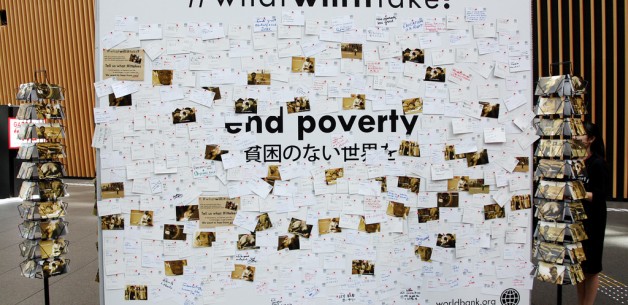This post is also available in: Arabic
Photo: Simone D. McCourtie / World Bank CC BY-NC-ND
The Bank Information Center (BIC), Center for International Environmental Law (CIEL), and Oxfam International have submitted recommendations to the World Bank Group on its proposed new approach to country engagement.
As part of the new World Bank Group (WBG or Bank) Corporate Strategy that was approved in October 2013, the Bank is changing its approach to how it will develop the frameworks for engagement in each of its borrowing client countries moving forward. As part of the new model, a Country Partnership Framework (CPF) will replace the Country Assistance/Partnership Strategy (CPS/CAS) and will be informed by a Systematic Country Diagnostic (SCD) that will aim to assess the key constraints and opportunities to alleviating poverty in said country. The Bank aims with the proposed changes to move toward a more selective and prioritized engagement in each of its borrowing countries.
The joint recommendations were submitted as part of an official consultation period on the new approach, which will be discussed by the Bank’s Board of Directors on May 27th 2014, with the new approach set to take effect in July 2014. Priority recommendations in the submission are:
- Inclusive citizen engagement with adequate information provision.
Requiring consultation with affected communities, citizens and civil society at all stages of the project cycle – starting with the Systematic Country Diagnostic (SCD) and then the Country Partnership Framework (CPF) and continuing engagement through the implementation and learning stages – will provide the WBG with greater opportunity for developing programming that can sustainably reduce poverty, enhance shared prosperity and identify, mitigate or avoid risks. To encourage effective engagement and ensure that consultations are sufficiently broad-based, we recommend that the Bank set minimum standards for consultation. Minimum standards should include, inter alia, the provision of adequate, relevant, timely information in nationally-appropriate language(s) and specific outreach, including to indigenous peoples, women, persons with disabilities, ethnic minorities, sexual minorities, and others who face discrimination or marginalization.
- Strong risk and opportunity assessment at SCD level which is then integrated into the CPF.
Multiple types of risks that have the potential to be exacerbated or lessened through Bank programming need to be assessed at the SCD stage and then planned for in the development of the CPF. These risks include environmental, social, human rights, and governance-related risks. We recommend making mandatory the use of upstream planning instruments, such as a Strategic Environmental and Social Assessment, to inform the SCD and the CPF. The Bank already uses this instrument in certain sectors to help identify risks and programmatic opportunities. Such instruments would allow for the integration of environmental and social considerations, including human rights and governance, at the broader strategy/sector level and would help inform project selection and design downstream and ultimately could help direct Bank interventions towards eliminating key constraints to poverty reduction.
- An analysis of inequality in the country with data on the gap between the bottom 40% and the top 10% should be included in the SCD and should inform the selection and design of priority areas and policies in the CPF to ensure that inequality is addressed programmatically.
- Strong measurable criteria, adequate budget, and incentives to ensure learning and results.
Given the Bank’s emphasis on results-based programming we would emphasize the importance of having strong criteria and outcome-based indicators against which results are measured; that country teams be given the adequate budgets to conduct rigorous analysis for SCDs, write strong results-based CPFs, and incorporate lessons learnt effectively and systematically; and that Bank staff be provided with the right incentives to prioritize strong development outcomes.
Read the complete submission:
Joint CSO submission to the World Bank Group on its new country engagement approach, BIC, Oxfam International, CIEL, May 8, 2014
Read a summarized version of the submission:
Summary of CPF/SCD recommendations, BIC, Oxfam International, CIEL, May 9, 2014

